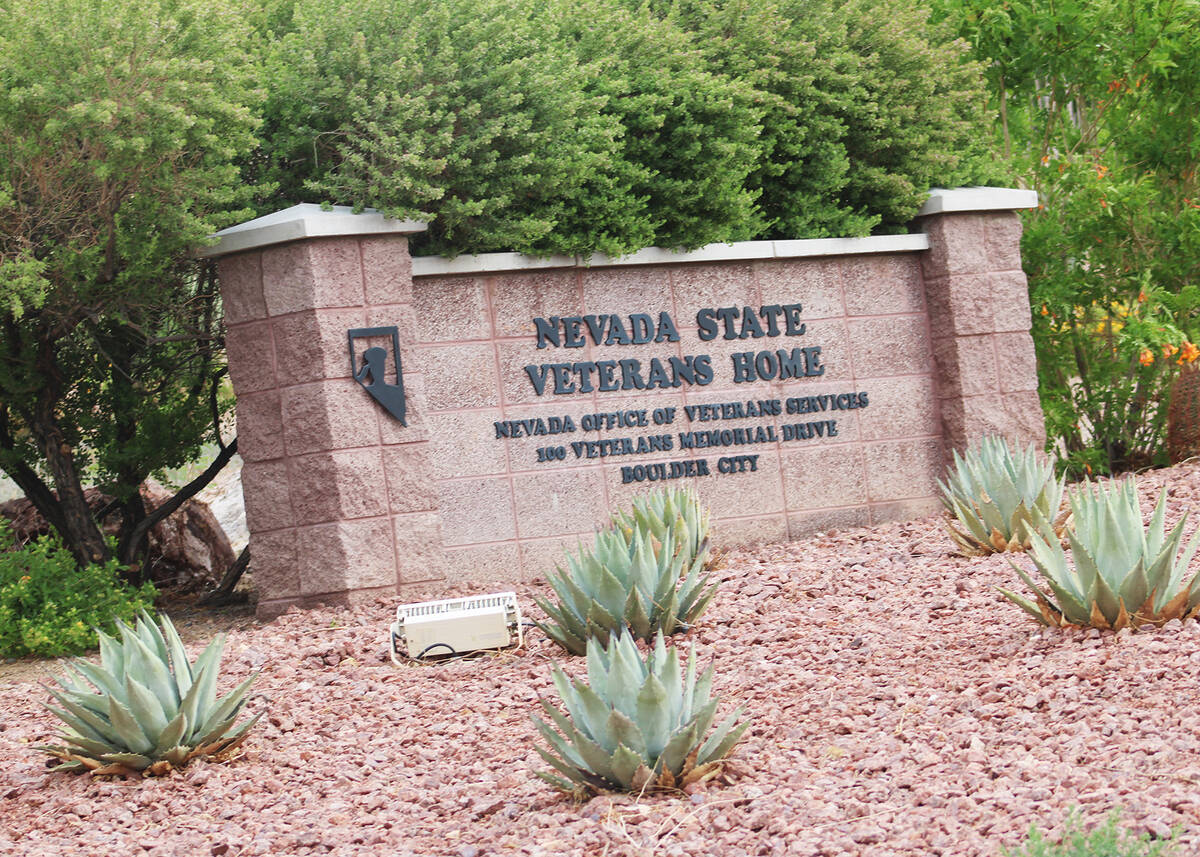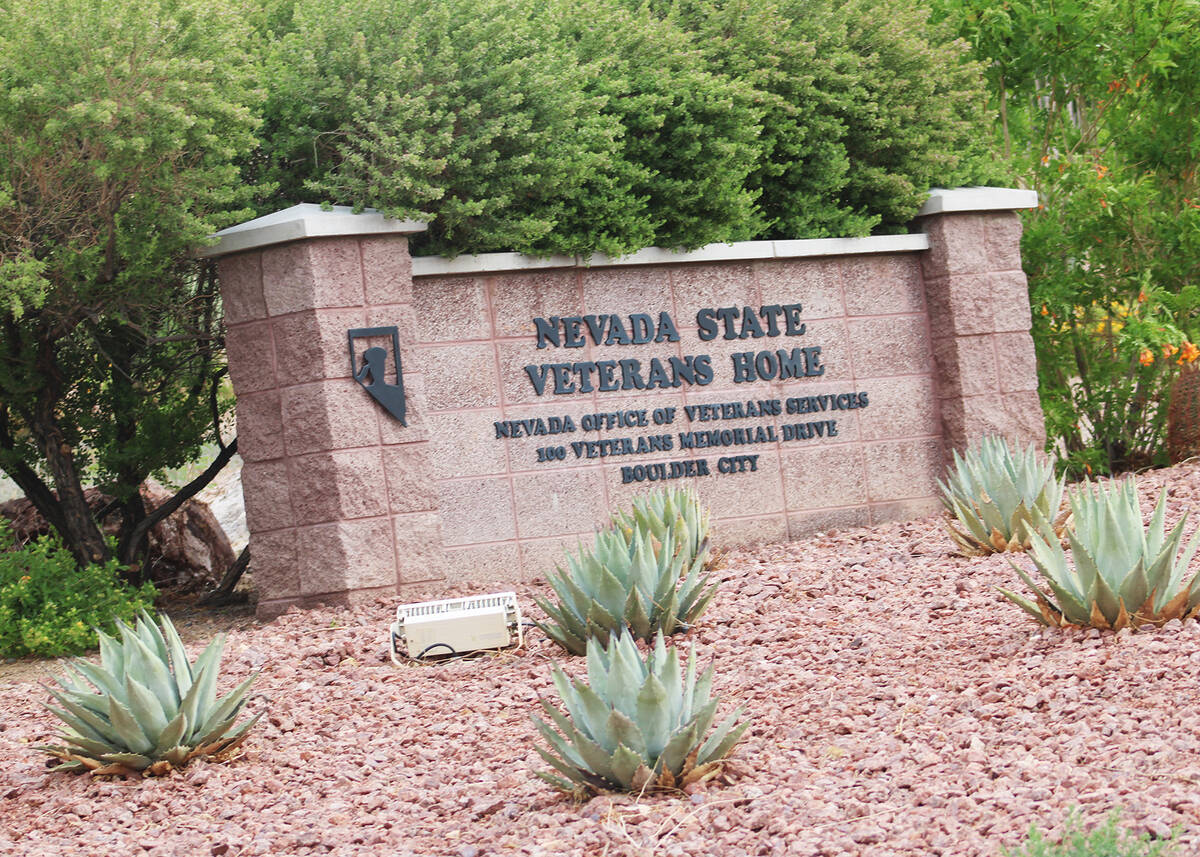Staffing issues hit vets home
A general shortage of nurses across the state has not spared long-term care facilities, including the Nevada State Veterans Home in Boulder City.
What that means in terms of impact on patients is a matter of some disagreement. In fact, state officials and the current administrator at the veterans home do not even appear to agree on the existence of a shortage.
According to a December study by the Nevada Health Workforce Research Center based at the University of Nevada, Reno, the state is short at least 4,000 nurses. Diego Trujillo, president and CEO of Las Vegas Health Care. says the shortage is even more dire than that. In January, in an interview with KTNV-TV, Channel 13, he said the shortage is closer to 5,000.
For more than three months, the Boulder City Review has been speaking with current and former staffers, ranging from nurses to administrators, at the veterans home about a variety of concerns. But one subject kept coming up — a shortage of nursing staff and a facility that, despite a general impression that the veterans home is full and has a waiting list, is currently at only 77% of capacity.
Poppy Helgren has been the director of nursing at the veterans home almost a decade. She is currently on FMLA leave and is a critic of current leadership of the Nevada Department of Veterans Services, which oversees the home in Boulder City as well as a similar but smaller home in Reno.
“I understand the veteran culture and camaraderie. My husband is a 20-year combat Army veteran. My mother was a World War II veteran of the Army (WAC). My father served in the Navy during the Korean War. After 9/11, I was commissioned as an Army nurse. I also have three sons that have honorably served in the Army and the Marines,” Helgren said in an emailed statement.
“I am very aware that the Covid pandemic caused nursing care shortages throughout the USA,” her statement continued.
“However, I believe the veterans’ home struggled even more, perhaps unnecessarily. The focus should be on recruiting, developing, and retaining staff. In my opinion, that was not the focus of decision makers involved, which has been a costly decision. Without adequate staffing numbers, there cannot be the excellent care that the resident veterans deserve.”
In an email addressing questions about both staff and resident levels, NDVS spokesperson Terri Hendry acknowledged that the veterans home is “facing a few staffing challenges” while pointing to steps she said were being undertaken to address the issue.
According to figures provided by NDVS, there are currently openings at the home for 12 certified nursing assistants, one licensed professional nurse and two registered nurses.
“We have been actively and aggressively recruiting to fill these positions through several avenues,” Hendry wrote. “We continue to offer our free CNA Training Academy. We are also using a recruiting agency, our own human resource assets, as well as posting job opportunities on our website and promoting through our newsletter and social media to fill positions.”
Hendry acknowledged that pay scale may be a part of those “challenges.”
“In terms of pay, as has been previously reported throughout the community and is commonly known, overall pay is lower at the state of Nevada than in the private sector,” she wrote. “The Legislature sets salaries. NDVS is pleased to hear that Nevada lawmakers passed, and the governor signed legislation allowing for a 12% raise for state of Nevada employees in State Fiscal Year (SFY) 2024 and another 4% raise in SFY 2025, making our salaries more competitive.”
According to multiple sources, the starting pay for a certified nursing assistant (the lower part of the hierarchy of nursing positions and the area with the most acute shortage at the veterans home) is currently $16.50 per hour. Even with the two years of raises recently passed, when fiscal 2025 rolls around in June of 2024, those raises will still not match the currently common scale of $21 per hour available at skilled nursing facilities in Henderson or Las Vegas.
Not everyone appears to be on the same page in terms of shortages. Contradicting the information provided by NDVS, the current (since March of this year) administrator at the facility says that there is no shortage.
“We have enough staff to service our residents and there is no legally mandated nurse-to-patient ratio in Nevada,” said Steve Pavlow in a brief phone call. At this time, only California and Massachusetts have legally mandated ratios of nurses to patients.
When it comes to retention of staff, extremely low employee morale was cited as an issue, with estimates ranging from what one former administrator said was a “50/50” split between the general shortage of nurses in the state and morale issues while two nurses currently employed at the veterans home said that morale is “100%” of the problem. (While a few people have agreed to be quoted about these issues, most current employees as well as former employees asked that their names not be used out of what they called a fear of retribution.)
Nurses are not the only people in short supply at the veterans home. The facility is rated to care for 180 patients. As of Tuesday, June 6, there were 140 patients, making the veterans home at 77% of capacity. This shortage has an effect on funding, though the significance of that effect is another point of contention.
Staff and administrators who have spoken to the Boulder City Review have said that after more than two years in which patient levels were not a focus, that there is strong pressure from management and state leaders to get the home back over 90% full. Staffers call 163 residents the “magic number.” That is because 163 is one resident more than 90%.
According to a 2022 study by doctors associated with the University of Pennsylvania and the Department of Veterans Affairs in Palo Alto, California, nearly a quarter of the patients who enter a skilled nursing facility such as the veterans home having come from a hospital will be re-admitted to the hospital within 30 days.
One source of funding for the veterans home is direct payments from the federal Veterans Administration. If the facility is more than 90% full, then the per diem funding for a hospitalized patient continues to flow to the state while the resident is in the hospital. If the resident level is below 90%, then daily funding is cut off for the time the resident is in the hospital.
According to current and former staffers, the per diem for a veteran who has been deemed at least 70% disabled is about $540 per day. So for every hospitalized, disabled resident in the hospital when the veterans home is under 90% full or 163 residents, there is a monthly deficit of more than $16,000.
Contradicting staff reports, Hendry stated, “But your conclusion, that this results in a substantial deficit for the home is wrong. What your source is NOT telling you is that our budget is offset by other revenue sources including Medicaid, Medicare, private insurance, etc.”
Staffers have reported that since the beginning of the COVID-19 emergency, requirements for admission were made substantially more stringent, which resulted in a substantial number of qualified veterans seeking care elsewhere.
Said Hendry, “We cannot discuss personnel, but we can discuss policy. We have had instances in the past, where policies were not followed and actions were taken independently, outside the knowledge of senior leadership that impacted our census. This has since been addressed.”
The one commonality expressed by everyone who was interviewed for this story is a desire to ensure that veterans are receiving the best care possible, and a fear that the challenges facing the veterans home mean that may not always be the case.
“I have great respect for the men and women who have served our country in the military,” Helgren said. “I believe this nation owes our veterans excellent care for what they have sacrificed.”
Contact reporter Bill Evans at wevans@bouldercityreview.com or at 702-586-9401.
















